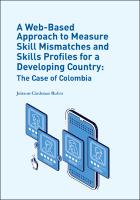A Web-Based Approach to Measure Skill Mismatches and Skills Profiles for a Developing Country
The Case of Colombia"
| dc.contributor.author | Cárdenas Rubio, Jeisson Arley | |
| dc.date.accessioned | 2022-11-18T05:32:41Z | |
| dc.date.available | 2022-11-18T05:32:41Z | |
| dc.date.issued | 2020 | |
| dc.identifier | OCN: 1354535358 | |
| dc.identifier.uri | https://library.oapen.org/handle/20.500.12657/59300 | |
| dc.description.abstract | "Several interdisciplinary studies highlight imperfect information as a possible explanation of skill mismatches, which in turn has implications for unemployment and informality rates. Despite information failures and their consequences, countries like Colombia (where informality and unemployment rates are high) lack a proper labour market information system to identify skill mismatches and employer skill requirements. One reason for this absence is the cost of collecting labour market data. Recently, the potential use of online job portals as a source of labour market information has gained the attention of researchers and policymakers, since these portals can provide quick and relatively low-cost data collection. As such, these portals could be of use for Colombia. However, debates continue about the efficacy of this use, particularly concerning the robustness of the collected data. This book implements a novel mixed-methods approach (such as web scraping, text mining, machine learning, etc.) to investigate to what extent a web-based model of skill mismatches can be developed for Colombia. The main contribution of this book is demonstrating that, with the proper techniques, job portals can be a robust source of labour market information. In doing so, it also contributes to current knowledge by developing a conceptual and methodological approach to identify skills, occupations, and skill mismatches using online job advertisements, which would otherwise be too complex to be collected and analysed via other means. By applying this novel methodology, this study provides new empirical data on the extent and nature of skill mismatches in Colombia for a considerable set of non-agricultural occupations in the urban and formal economy. Moreover, this information can be used as a complement to household surveys to monitor potential skill shortages. Thus, the findings are useful for policymakers, statisticians, and education and training providers, among others." | |
| dc.language | English | |
| dc.subject.classification | thema EDItEUR::T Technology, Engineering, Agriculture, Industrial processes::TB Technology: general issues | en_US |
| dc.subject.classification | thema EDItEUR::T Technology, Engineering, Agriculture, Industrial processes::TJ Electronics and communications engineering::TJK Communications engineering / telecommunications | en_US |
| dc.subject.classification | thema EDItEUR::U Computing and Information Technology::UT Computer networking and communications::UTF Network management | en_US |
| dc.subject.other | Technology & Engineering | |
| dc.subject.other | Technology & Engineering | |
| dc.subject.other | Telecommunications | |
| dc.subject.other | Computers | |
| dc.subject.other | Networking | |
| dc.subject.other | Intranets & Extranets | |
| dc.title | A Web-Based Approach to Measure Skill Mismatches and Skills Profiles for a Developing Country | |
| dc.title.alternative | The Case of Colombia" | |
| dc.type | book | |
| oapen.identifier.doi | https://doi.org/10.12804/urosario9789587845457 | |
| oapen.relation.isPublishedBy | ecc13ec1-5683-4068-9eb5-c27b3c9c3671 | |
| oapen.relation.isFundedBy | b818ba9d-2dd9-4fd7-a364-7f305aef7ee9 | |
| oapen.relation.isbn | 9789587845464 | |
| oapen.collection | Knowledge Unlatched (KU) | |
| oapen.imprint | Editorial Universidad del Rosario | |
| oapen.identifier | https://openresearchlibrary.org/viewer/6a2bb6c9-d27d-4c70-bd72-9755c23b3744 | |
| oapen.identifier.isbn | 9789587845464 |

